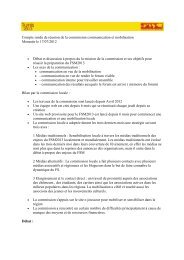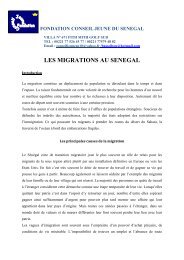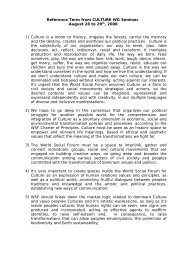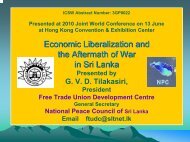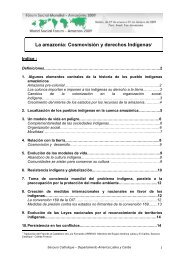Create successful ePaper yourself
Turn your PDF publications into a flip-book with our unique Google optimized e-Paper software.
<strong>Press</strong> <strong>Report</strong> <strong>Europe</strong> <strong>WSF</strong> <strong>2009</strong><br />
Green gold should not be funnelled through the IMF but rather through some new entity with an appropriate overseer,<br />
such as the United Nations Environmental Program (UNEP). Its authoritative scientific committee, the Intergovernmental<br />
Panel on Climate Change (IPPC), should certainly play a major role in setting criteria and evaluating the results.<br />
Countries would apply for funding to implement their national plans to reduce greenhouse gas emissions. In order to<br />
qualify, each country would be required to meet its international commitments to reduce greenhouse gases. Complete<br />
transparency in allocating and contracting could be a further condition for receiving money.<br />
How big should a green gold program be? Estimates are that $500bn – or less than half of the global stimulus package<br />
the IMF is currently calling for – would cover the annual cost of protecting the world’s climate.<br />
In terms of job creation, economic stimulus and support for long-term growth – not to mention warding off climate<br />
disaster – nothing is likely to provide bigger benefits than investment in climate protection.<br />
If the world can spend trillions of dollars to bail out the banks, why can’t we use green gold to create desperately needed<br />
green jobs – and bail out the planet?<br />
Dear capitalists, admit you got it wrong (The Economist)<br />
Buoyed up by a crisis and with five presidents in attendance, the international left has ideas for fixing the world<br />
that a neoliberal might recognise<br />
OFTEN mocked for an endless ability to disagree with itself, the World Social Forum—an annual jamboree for NGOs,<br />
anti-capitalists, leftish intellectuals, bohemians and bishops—was unusually united this year. More united, in some ways,<br />
than the recent World Economic Forum in the Swiss resort of Davos, a gathering of political and corporate bigwigs to<br />
which the social forum supposedly responds.<br />
While Davos Man was busy looking for someone to blame for his predicament, no such doubts troubled his opposite<br />
number in Belém, a city on the edge of the Brazilian rainforest where mango trees grow so tall that their fruits can shatter<br />
car windscreens when they fall. The culprit was the whole current design of the world economy, promoting competition.<br />
Free trade and free movement of capital needed to be re-thought, participants insisted. Some even had ideas on what<br />
should replace it.<br />
The forum’s main purpose is to bring together social movements (which generally dislike being called NGOs) from<br />
around the world to network. In that respect, it is rather like any other business conference, though some participants<br />
carry spears and wear the feathers of various unfortunate parrots on their heads. The forum is skewed towards Latin<br />
America, especially Brazil. One of the founders of the forum is a Brazilian businessman called Oded Grajew, and its first<br />
meeting was held in Porto Alegre, in southern Brazil.<br />
Of more than 5,000 accredited organisations, 4,193 were from South America, roughly ten times the number of African<br />
outfits present. This partly reflects the number and prominence of NGOs in South America and the semi-official role<br />
which some governments give them. This year Brazil’s left-leaning government gave the forum a subsidy of R$120m<br />
($52m)—a piece of generosity that was not universally popular at a time when economic growth may be on the verge of<br />
halting.<br />
As a result, many causes dear to the Brazilian left were well represented. T-shirts demanded asylum for Cesare Battisti,<br />
a left-wing Italian émigré convicted of murder in Rome, who is currently in Brazil. Banners called for Brazilian troops to be<br />
withdrawn from Haiti, where they are doing a good job of containing violence.<br />
A proposed hydroelectric dam on the Madeira river (a tributary of the Amazon) was denounced, and the country’s new oil<br />
find claimed for its people. Plenty of people came from further afield, like the Catholic Bishops’ Conference of India, with<br />
a Delphic slogan: “We would rather sweat in peace than bleed in war.” And there were swarms of young, largely white<br />
folk who treated the forum like a music festival.<br />
This cacophony sometimes sat awkwardly with the presence of five leftish presidents—Fernando Lugo of Paraguay,<br />
Rafael Correa of Ecuador, Evo Morales of Bolivia, Hugo Chávez of Venezuela and Luiz Inácio Lula da Silva of Brazil—<br />
58




